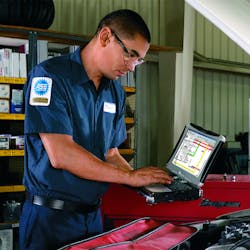The job of today’s commercial vehicle technician is more challenging than ever before. Vehicles are becoming far more complex as additional complicated and technical systems are incorporated into them. The pace of new vehicle technology continues to increase as well.
At the same time, diagnostic and repair equipment are becoming more sophisticated.
Vehicle repair and maintenance is only as good as the know-how and skills of the technicians that perform this work.
Therefore, continuous learning and training is an absolute must for vehicle technicians in order to keep up with the latest information and technologies. Training goes a long way in the development of technicians as it helps improve skills and increase competencies.
All companies use some form of training. The question is: How do you know if your technician training is effective?
To gain some insight into this matter, Fleet Maintenance editor David A. Kolman spoke with Jake Schell, the coordinating senior editor at Mitchell 1. Since 1918, Mitchell 1 has provided information solutions that help make automotive professionals’ jobs easier.
Over the years, Mitchell 1’s products have changed, with its Mitchell Manuals given way to TeamWorks, the integrated family of software-based solutions anchored by the product recognized as the standard for automotive repair information: Mitchell 1 OnDemand5.
Q: Why is training and learning development so important for vehicle technicians?
A: The days in which a technician can specialize in one service area and ignore the others are numbered. Truck technology increases in complexity every year.
In fact, an ever growing number of vehicle systems communicate via the vehicle bus onboard communication network, virtually making the truck aware of its surroundings and needs.
Consequently, servicing this complex technology demands a continuous learning process for the technician. In order to quickly and accurately diagnose and repair today’s vehicles, a technician must know how components and systems interact with one another.
Not only that, the technician must also synthesize service information, scan tool outputs, and past experience to resolve, or prevent, vehicle problems.
Q: How and why can effective training tools improve technician performance?
A: Service tools exist in abundance to help the technician. However, an expensive scan tool does very little for the technician who does not know how it works.
Similarly, detailed service information, like Tractor-Trailer.net, may as well be written in a foreign language for all the good it will do the technician who does not understand it.
(Tractor-Trailer.net is the trucking industry’s first complete web-based service and repair information source for all heavy duty tractors, dry vans and reefers dating back to 1990.)
This is why TMCSuperTech (the Technology & Maintenance Council’s national technician skills competition) tests for proficiency in using service information.
In effect, without training, service tools and information could equate to dollars spent without a return on the investment.
Even worse, the technician stands a much greater chance of breaking something else on the truck, or getting personally injured. On the other hand, these issues may be reduced or eliminated through proper technician training.
Q: What are some key considerations for selecting effective vehicle repair and maintenance training information and materials?
A: A regular training program provides the single greatest asset to the technician’s diagnostic arsenal. Training places the technician in a controlled environment where processes and tools are learned independently of one another.
For example, in a training scenario, the technician can be led through an entire service information selection containing theory and operation, diagnosis and repair. Each area contains information vital to accurate service.
Making the technician aware this information exists before actual service work begins will only help improve technician performance.
Q: Clearly, to be most effective, training needs to be planned, then managed and administered. Correct?
A: Of course, every shop will have different training needs based on the work performed. Nevertheless, since the vehicle systems are so integrated, it will be in the shop’s best interest to provide at least a full vehicle overview when considering a training program.
In addition, shops with multiple technicians should consider designating a trainer. The trainer would serve to establish the training the shop requires.
Training for the sake of training accomplishes little and becomes drudgery. In contrast, receiving training that adds efficiency to service tasks will surely get the technician’s attention.
Q: Wouldn’t you agree that through continuous training, technicians are always improving their abilities and expanding their knowledge?
A: It is unlikely that truck technology will return to the good old days. Like other technologies, the advancements just keep coming.
Consequently, to be effective, technicians will need to continually learn how new truck technologies work and interact.
Moreover, continuous and varied training will enrich the technician by bringing multiple disciplines to bear in an increasingly complex field.
About the Author

